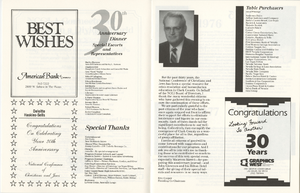Search the Special Collections and Archives Portal
Search Results
Gail S. McQuary oral history interviews
Identifier
Abstract
Oral history interviews with Gail S. McQuary conducted by Joanne L. Goodwin on April 14, 1997, April 25, 1997 and May 28, 1997 for the Women's Research Institute of Nevada (WRIN) Las Vegas Women Oral History Project. McQuary opens her interviews with a discussion of her childhood and her introduction to dance in California. McQuary then talks about getting recruited to perform in Las Vegas, Nevada at the Sahara Hotel and Casino while performing at a fair. McQuary goes on to describe her dance career in Las Vegas and the other casinos where she worked. McQuary also talks about how dancing and shows in Las Vegas changed throughout the years.
Archival Collection
Hazel Hedges oral history interview
Identifier
Abstract
Oral history interview with Hazel Hedges conducted by Irene Rostine on October 29, 1997 for the Women's Research Institute of Nevada (WRIN) Las Vegas Women Oral History Project. Hedges opens her interview by discussing her move to Las Vegas, Nevada from Kansas in 1952. She discusses what it was like to move across the country at that time and her search for employment. Hedges describes her work as a waitress at the Thunderbird Hotel and her true interest, real estate. Hedges talks about her real estate career which began in 1960, how that job allowed her to see Las Vegas grow, and her success in the industry. Lastly, Hedges discusses organizations at the time that assisted in the training of women realtors and her own community work.
Archival Collection
Claude Trenier oral history interview
Identifier
Abstract
Oral history interview with Claude Trenier conducted by Claytee White on February 13, 1997 for the Women's Research Institute of Nevada (WRIN). Trenier discusses joining a band at the age of twenty two in 1941 and traveling around the country. Trenier describes working in Las Vegas, Nevada; Miami, Florida; and New York City, New York. Trenier also discusses the racism he saw as an African American performer, recalling that racial discrimination was especially fervent in Las Vegas. Trenier describes how many African American musicians and performers were allowed to perform in casinos, but not reside or lounge on the properties. Trenier also discusses the Moulin Rouge and his thoughts about its sudden closure in 1955. Finally, Trenier talks about his interactions with other entertainers at the time like Duke Ellington and Nat Cole King.
Archival Collection
Diana Saunders oral history interviews
Identifier
Abstract
Oral history interviews with Diana Saunders conducted by Joyce (Marshall) Moore on May 23, 1996, conducted by Brigid Kelly on July 22, 2002, and conducted by Joanna Goodwin on August 12, 2002 for the Women's Research Institute of Nevada (WRIN) Las Vegas Women Oral History Project. In her interviews Saunders discusses her dance career in New York City, New York. Saunders discusses working on Broadway and touring internationally in Europe and Australia as a dancer. Saunders discusses working at the Dunes in Las Vegas, Nevada and her experiences as a dancer in Las Vegas. Saunders also talks about the lengths dancers had to go through to be successful.
Archival Collection
Lucille Bryant oral history interview
Identifier
Abstract
Oral history interview with Lucille Bryant conducted by Claytee White on December 13, 1995 and March 01, 1996 for the Women's Research Institute of Nevada (WRIN) Las Vegas Women Oral History Project. Bryant begins the interview discussing her early life in Tallulah, Louisiana. Next Bryant discusses moving to Las Vegas, Nevada to look for work in 1953. Bryant discusses at length life in Tallulah from work to race relations. Bryant goes on to discuss her husband and children and to describe their family life. Bryant lastly discusses her experiences as an African American woman employed as a housekeeper on the Strip and her involvement in the Culinary Union local 226.
Archival Collection
Betty Bunch oral history interview
Identifier
Abstract
Oral history interview with Betty Bunch conducted by Joyce (Marshall) Moore on January 09, 1996 and February 07, 1996 for the Women's Research Institute of Nevada (WRIN) Las Vegas Women Oral History Project. In this interview, Bunch discusses the origins of her dance career and the places her pursuit of this career took her. Bunch discusses the various shows she performed in both in the United States and Europe, and describes the differences between a dancer and a showgirl. Bunch describes the responsibilities and rights of dancers, their contracts, and their leisure activities. Finally, Bunch also discusses her personal life including two of her marriages.
Archival Collection
Alice Key oral history interview
Identifier
Abstract
Oral history interview with Alice Key conducted by Claytee D. White on February 17 and March 24, 1997 for the Women's Research Institute of Nevada (WRIN) Las Vegas Women Oral History Project. In this interview Alice Key discusses being a chorus line dancer at the Cotton Club in Culver City, California and then moving to Las Vegas, Nevada after her dancing career ended. She then talks about working as a reporter, her involvement with the civil rights movement in Las Vegas, and creating the first all-black television show in the country: Talk of the Town.
Archival Collection
Kim Krantz oral history interview
Identifier
Abstract
Oral history interview with Kim Krantz conducted by Joyce (Marshall) Moore on February 26, 1996 for the Women's Research Institute of Nevada (WRIN) Las Vegas Women Oral History Project. Krantz begins her interview discussing her transition from an east coast dancer to a Las Vegas, Nevada dancer. Krantz discusses the performing scene at the time and the general distaste dancers had for showgirls. Krantz goes on to discusses the details of nudity in performances and the relationships show directors like Harold Minsky and Donn Arden had with their performers. Krantz also discusses her experiences as a dancer and her opinions about the treatment of African American dancers.
Archival Collection

Morgan H. Mills interview, March 26, 1981: transcript
Date
Archival Collection
Description
On March 26, 1981, Matthew A. Carr interviewed Morgan Mills (b. July 27, 1914 in Grand Junction, Colorado) about his life in Boulder City, Nevada and his work at the Boulder (Hoover) Dam site. Mills speaks primarily about his time working on the dam as a mechanic with the United States Bureau of Reclamation, as a tourist guide with the Boulder City Tourist Bureau and as a musician in local bands. Moreover, Mills speaks about attending the University of Nevada, Reno and playing music there. Lastly, he talks about the Great Depression, how it affected Las Vegas and Boulder City, the development of different infrastructure and the speakeasies in Boulder City during the Prohibition era.
Text

Program for 30th Anniversary Dinner event for the Southern Nevada Chapter of the National Conference of Christians and Jews, 1988
Date
Archival Collection
Description
The program for the 30th anniversary dinner for NCCJ includes dedications and highlights of the Southern Nevada Chapter.
Text
